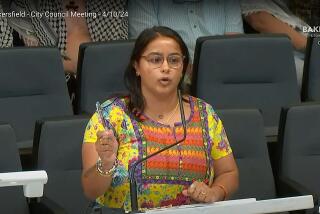Colorado woman’s quest for jihad baffles neighbors

To those who knew her, Shannon Maureen Conley was a bright teenager lost in middle-class suburbia who went searching for love and purpose.
She thought she found it half a world away with a Tunisian man 13 years her senior who promised marriage and holy war. The plan went only as far as Denver International Airport, where Conley was arrested in April as she tried to board a plane to support Islamic fighters in Syria.
Conley told the FBI she was determined to be “defending Muslims on the Muslim homeland against people who are trying to kill them.” If that was illegal, she added, she “would rather be in prison than do nothing.”
The 19-year-old Colorado woman is now under federal indictment, charged with conspiracy to aid Islamic State, the extremist military force with ties to Al Qaeda that has been on the march across Iraq and Syria.
Her transformation from a smiling girl, often clad in shorts or jeans and a floppy hat, who chatted with friends, to a solemn, dreamy young woman wearing the long dresses and flowing head scarves of traditional Islam, is one that neighbors and school administrators said came relatively suddenly.
She had been “among the brightest kids” at Arvada West High School, said principal Rob Bishop, adding that she was the daughter of a professor at a Catholic university, was enrolled in honors courses and presented no discipline problems.
Sometime during her junior year, Bishop said, Conley had begun to wear traditional Muslim dress. Several girls complained that she was kneeling on the bathroom floor three times a day for her prayers.
“I talked to her about accommodating her to get her out of the bathroom and move her into an office in our school’s front offices,” Bishop said. Conley told him she was converting to Islam and seemed grateful for his support.
Neighbors, too, noticed the change in her appearance, and said she often seemed lonely and reflective. Many neighbors were not closely acquainted with Conley or her parents. Her mother, Ana Marie Conley, is an associate professor of economics at Regis College, while her father, John Conley, works in the computer field and teaches martial arts out of his garage on weekends, according to neighbors.
Robert Taylor, who lives nearby, said he would sometimes see Conley sitting alone in a neighborhood park, drifting silently on the playground swing.
“She just seemed kind of lost,” he said.
On Conley’s Facebook page, she began calling herself Halima, an Arabic name meaning “gentle and mild-mannered,” and described her work as a “slave to Allah.”
In fall 2013, Conley began showing up at Faith Bible Church, a Christian mega-church not far from her home known for its support of Israel. Pastor George Morrison said members became unnerved by the frequent sightings of the young woman in Muslim dress, carrying a large backpack and wandering in and out of classes and services.
The church has a history. In December 2007 a gunman opened fire at the dormitory of a missionary group that shares campus space at the church, killing two and wounding two others.
Morrison said staff repeatedly asked Conley if she had questions about the church or wanted to join.
She declined, saying she was a Muslim doing research. Morrison said he didn’t see her as a threat: “I felt like from the beginning she was a wannabe,” he said. Still, on Nov. 3, the church finally asked her not to come back, and four days later, the FBI conducted what was to be the first of many interviews with Conley.
According to an affidavit filed in court, Conley was asked why she had gone to the church. “I hate those people,” she replied, adding that once church leaders began to watch her, she decided to goad them by pretending to take notes. “If they think I’m a terrorist, I’ll give them something to think I am.”
She told FBI agents she had signed up for a weekend with the U.S. Army Explorers, a career program offered under the umbrella of the Boy Scouts of America, to be trained in military tactics and firearms. Her intention, she said, was “to use that training to go overseas to wage jihad.”
FBI agents initially interviewed Conley’s parents in February, asking them to engage their daughter in “candid conversation” about Islam.
Though they have declined to be interviewed by reporters, it is apparent from court documents that the Conleys’ alarm about their daughter was growing. On March 10, the FBI said, John Conley called the FBI and told agents he had not realized that his daughter had become so extreme. A few days later, he recounted walking in on a Skype conversation his daughter was having with a man she said she had met online.
The man, whose name is redacted in the complaint, asked Conley if he could marry his daughter and bring her to the Middle East.
Her father refused, but Conley said she was going anyway. On April 1, John Conley said, he found on his desk a one-way ticket to Turkey for his daughter and called the FBI.
In all, federal agents met with Conley eight times between Nov. 7 and April 8, and six times with her parents. Court documents describe agents trying to dissuade her from the notion of jihad, and suggesting the option of working for a humanitarian organization. But Conley’s determination only appeared to grow.
The Islamic State of Iraq and Syria, as the group was called until recently, fighter she had met online was her “suitor,” she said, and she planned to travel to meet him. They would live near the border between Turkey and Syria. She would be “a housewife and the camp nurse,” and if necessary take up arms, she said. “I wouldn’t like it ... but I would do it.”
She made it as far as Denver International Airport, where on April 8 she checked in for her flight to Frankfurt, with a connection to Turkey, and made it halfway down the jetway before she was confronted by the FBI and taken into custody.
The U.S. attorney and FBI have declined to comment on the case, as has Conley’s public defender.
Since her arrest, the initial complaint charging her with providing material support to a terrorist group has been reduced to a conspiracy charge that carries a maximum of five years in prison rather than 15.
Back in Arvada, neighbors along Taft Circle are more saddened than fearful. When Conley disappeared in April, they thought she had moved.
Once the news broke July 2 and TV trucks began arriving, Taylor slipped a note into the Conleys’ front door offering support. So far, they haven’t responded.
Recently at Faith Bible Church, Morrison offered a special prayer for the young woman sitting in a jail cell.
“I never thought she was dangerous, but you never know,” he said later. “She ignored every warning they gave her. She was crossing a line, stepping into an area that could’ve sucked her into something really bad. I think maybe getting arrested just might have saved her life.”
More to Read
Start your day right
Sign up for Essential California for news, features and recommendations from the L.A. Times and beyond in your inbox six days a week.
You may occasionally receive promotional content from the Los Angeles Times.






